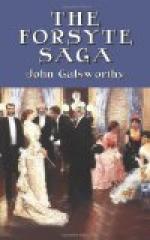He followed the others slowly up the steps, leaning on his umbrella, and stood a moment to get his breath. The Inspector said: “This is the mortuary, sir. But take your time.”
In the bare, white-walled room, empty of all but a streak of sunshine smeared along the dustless floor, lay a form covered by a sheet. With a huge steady hand the Inspector took the hem and turned it back. A sightless face gazed up at them, and on either side of that sightless defiant face the three Forsytes gazed down; in each one of them the secret emotions, fears, and pity of his own nature rose and fell like the rising, falling waves of life, whose wish those white walls barred out now for ever from Bosinney. And in each one of them the trend of his nature, the odd essential spring, which moved him in fashions minutely, unalterably different from those of every other human being, forced him to a different attitude of thought. Far from the others, yet inscrutably close, each stood thus, alone with death, silent, his eyes lowered.
The Inspector asked softly:
“You identify the gentleman, sir?”
Old Jolyon raised his head and nodded. He looked at his brother opposite, at that long lean figure brooding over the dead man, with face dusky red, and strained grey eyes; and at the figure of Soames white and still by his father’s side. And all that he had felt against those two was gone like smoke in the long white presence of Death. Whence comes it, how comes it—Death? Sudden reverse of all that goes before; blind setting forth on a path that leads to where? Dark quenching of the fire! The heavy, brutal crushing—out that all men must go through, keeping their eyes clear and brave unto the end! Small and of no import, insects though they are! And across old Jolyon’s face there flitted a gleam, for Soames, murmuring to the Inspector, crept noiselessly away.
Then suddenly James raised his eyes. There was a queer appeal in that suspicious troubled look: “I know I’m no match for you,” it seemed to say. And, hunting for handkerchief he wiped his brow; then, bending sorrowful and lank over the dead man, he too turned and hurried out.
Old Jolyon stood, still as death, his eyes fixed on the body. Who shall tell of what he was thinking? Of himself, when his hair was brown like the hair of that young fellow dead before him? Of himself, with his battle just beginning, the long, long battle he had loved; the battle that was over for this young man almost before it had begun? Of his grand-daughter, with her broken hopes? Of that other woman? Of the strangeness, and the pity of it? And the irony, inscrutable, and bitter of that end? Justice! There was no justice for men, for they were ever in the dark!
Or perhaps in his philosophy he thought: Better to be out of, it all! Better to have done with it, like this poor youth....
Some one touched him on the arm.




